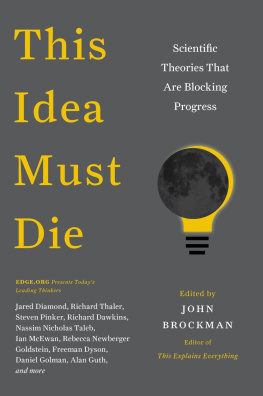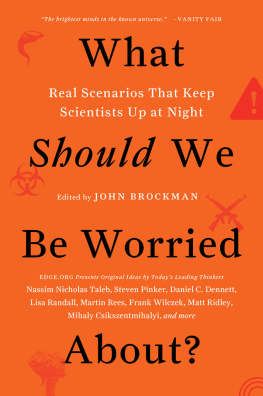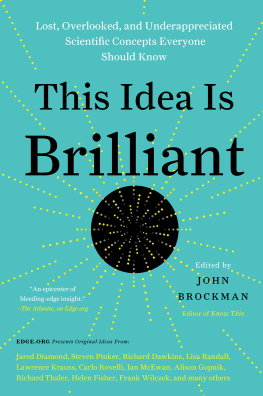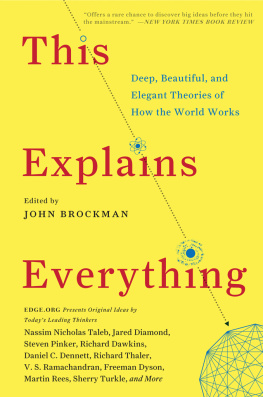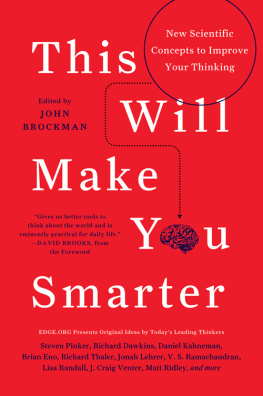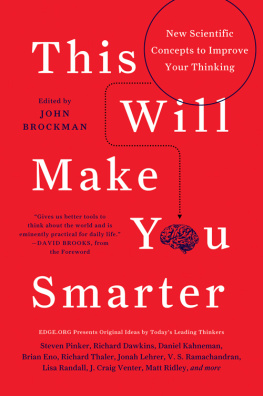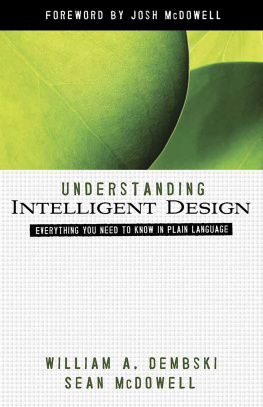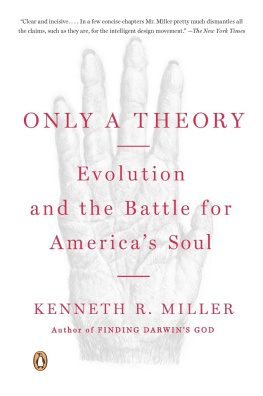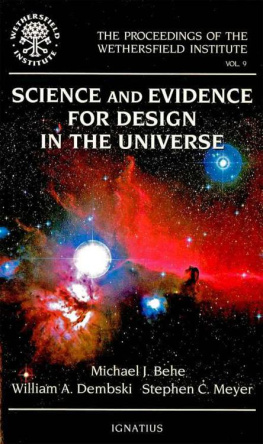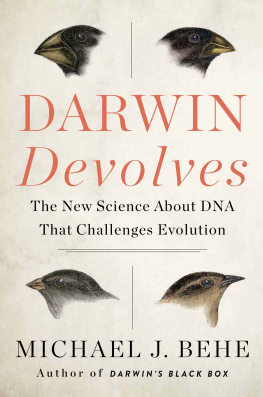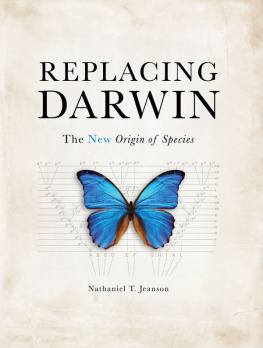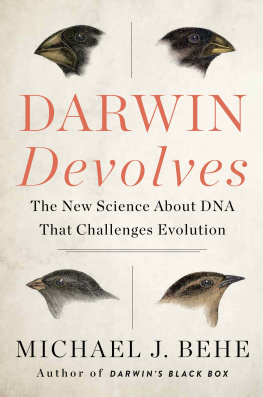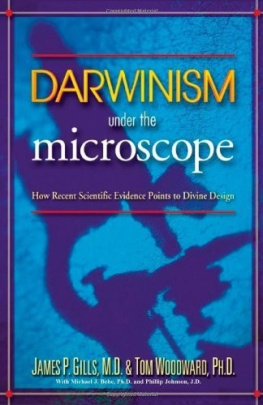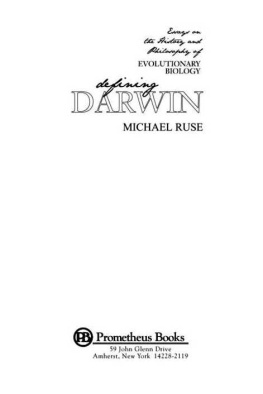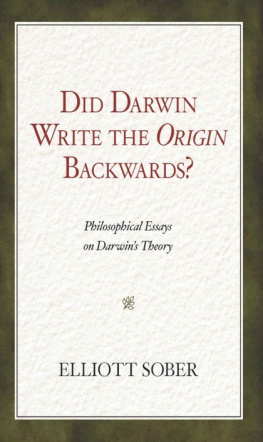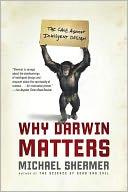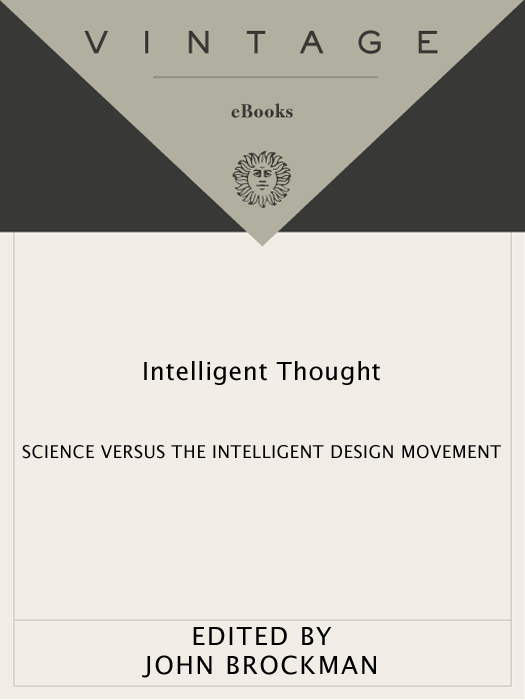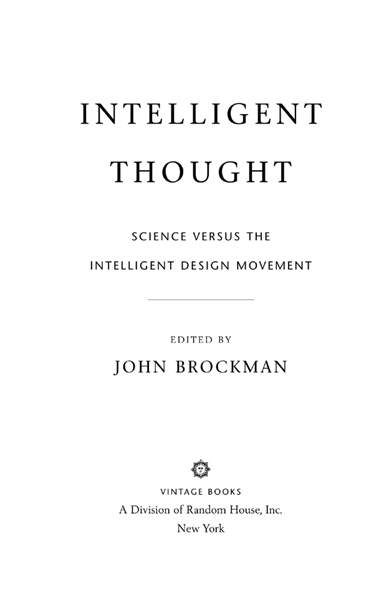
JOHN BROCKMAN
INTELLIGENT THOUGHT
John Brockman, editor of many books including The Next Fifty Years, Curious Minds, What We Believe But Cannot Prove, My Einstein, is also the author of By the Late John Brockman and The Third Culture. He is the founder and CEO of Brockman, Inc., a literary and software agency, and the publisher of the Web site Edge, the forum for leading scientists and thinkers to share their research with the general public. He lives in New York City.
www.edge.org
BOOKS BY JOHN BROCKMAN
AS AUTHOR:
By the Late John Brockman
37
Afterwords
The Third Culture: Beyond the Scientific Revolution
Digerati
AS EDITOR:
About Bateson
Speculations
Doing Science
Ways of Knowing
Creativity
The Greatest Inventions of the Past 2,000 Years
The Next Fifty Years: Science in the First Half of the
Twenty-first Century
Curious Minds: How a Child Becomes a Scientist
The New Humanists: Science at the Edge
What We Believe But Cannot Prove: Todays Leading
Thinkers on Science in the Age of Certainty
My Einstein: Essays by the Worlds Leading Thinkers on the Man, His Work, and His Legacy
AS COEDITOR:
How Things Are
FIRST VINTAGE BOOKS EDITION, MAY 2006
Copyright 2006 by John Brockman
All rights reserved. Published in the United States by Vintage
Books, a division of Random House, Inc., New York, and in
Canada by Random House of Canada Limited, Toronto.
Vintage and colophon are registered trademarks of
Random House, Inc.
The Cataloging-in-Publication Data is on file at
Library of Congress.
eISBN: 978-0-307-42640-6
Author photograph Tobias Everke
www.vintagebooks.com
v3.1
Acknowledgments
I AM GRATEFUL to Marty Asher of Vintage Books for his continuing interest in science-minded ideas and his passionate support of this project. I am also indebted to my agent, Max Brockman, who immediately understood the need for this book. And as always, I am indebted to Sara Lippincott for her thoughtful and meticulous editing.
Contents
JOHN BROCKMAN
Introduction
SOMETHING RADICALLY NEW is in the air: new ways of understanding physical systems, new ways of thinking about thinking that call into question many of our basic assumptions. A realistic biology of the mind, advances in evolutionary biology, physics, information technology, genetics, neurobiology, psychology, engineering, the chemistry of materialsall are issues of critical importance with respect to what it means to be human. For the first time in our collective history, we have the tools and the will to undertake the scientific study of human nature.
Nobody ever voted for the telephone, the automobile, for printing, for television, or for electricity, I wrote in 1969. And science-based reality continues: Nobody voted for the computational idea, for cybernetics, for the mathematical theory of information, for the Internet. Governments and politicians, operating through rearview mirrors, can only play catch-up. Science is the big news. Science is the important story. Science is public culture.
Yet at the same time, religious fundamentalism is on the rise around the world, and our own virulent domestic version of it, under the rubric of intelligent design, by elbowing its way into the classroom abrogates the divide between church and state that has served this country so well for so long. Moreover, the intelligent-design (ID) movement imperils American global dominance in science and in so doing presents the gravest of threats to the American economy, which is driven by advances in science and in the technology derived therefrom.
This booksixteen essays by leading scientists from several disciplinesis a thoughtful response to the bizarre claims made by the ID movements advocates, whose only interest in science appears to be to replace it with beliefs consistent with those of the Middle Ages. School districts across the countrymost notably in Kansas and later in Pennsylvania, where the anti-evolutionist tide was turned but undoubtedly not stoppedhave been besieged by demands to teach the debate, to present the controversy, when, in actuality, there is no debate, no controversy. What there is, quite simply, is a duplicitous public-relations campaign funded by Christian fundamentalist interests.
In some ways, the media chatter provoked by the intelligent-design movement has made collective fools of large segments of the American public. Educated Americans are dumbstruck by the attempt of the state of Kansas to officially redefine science to include the supernatural. Europeans cannot believe that such an argument should be raging in the twenty-first centuryand in the United States, of all places, the seat of our most advanced technology and a leader in so many areas of scientific research.
Fortunately, Judge John E. Jones III, of the United States District Court for the Middle District of Pennsylvania, in his December 2005 decision in Kitzmiller et al. v. Dover Area School District, hastemporarily, at leasthalted ID in its tracks. Readers can rely on the writings of the scientists in this volume. They can also rely on the words of this lifelong Republican jurist, who was appointed to the court by the current President of the United States (himself a born-again Christian fundamentalist).
In his decision, Judge Jones writes:
After a searching review of the record and applicable case law, we find that while ID [intelligent design] arguments may be true, a proposition on which the Court takes no position, ID is not science. We find that ID fails on three different levels, any one of which is sufficient to preclude a determination that ID is science. They are: (1) ID violates the centuries-old ground rules of science by invoking and permitting supernatural causation; (2) the argument of irreducible complexity, central to ID, employs the same flawed and illogical contrived dualism that doomed creation science in the 1980s; and (3) IDs negative attacks on evolution have been refuted by the scientific community [I]t is additionally important to note that ID has failed to gain acceptance in the scientific community, it has not generated peer-reviewed publications, nor has it been the subject of testing and research.
In characterizing the Dover School Boards decision to offer intelligent design in the classroom as an alternative to the Darwinian theory of evolution by natural selection, he employs two words that will go down in history: breathtaking inanity. To Judge Jones, it is abundantly clear that the Boards ID Policy violates the Establishment Clausethat is, the Constitutions First Amendment (Congress shall make no law respecting an establishment of religion, or prohibiting the free exercise thereof). He continues: In making this determination, we have addressed the seminal question of whether ID is science. We have concluded that it is not, and moreover that ID cannot uncouple itself from its creationist, and thus religious, antecedents.


